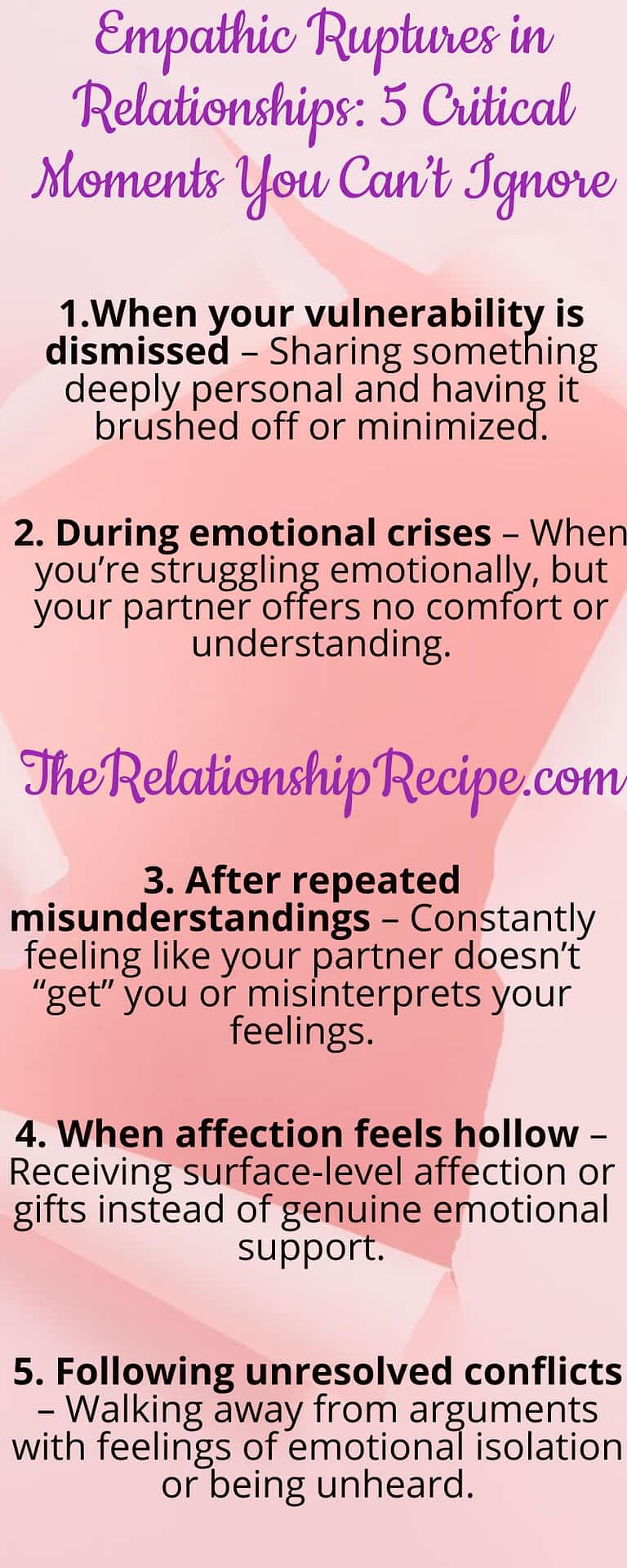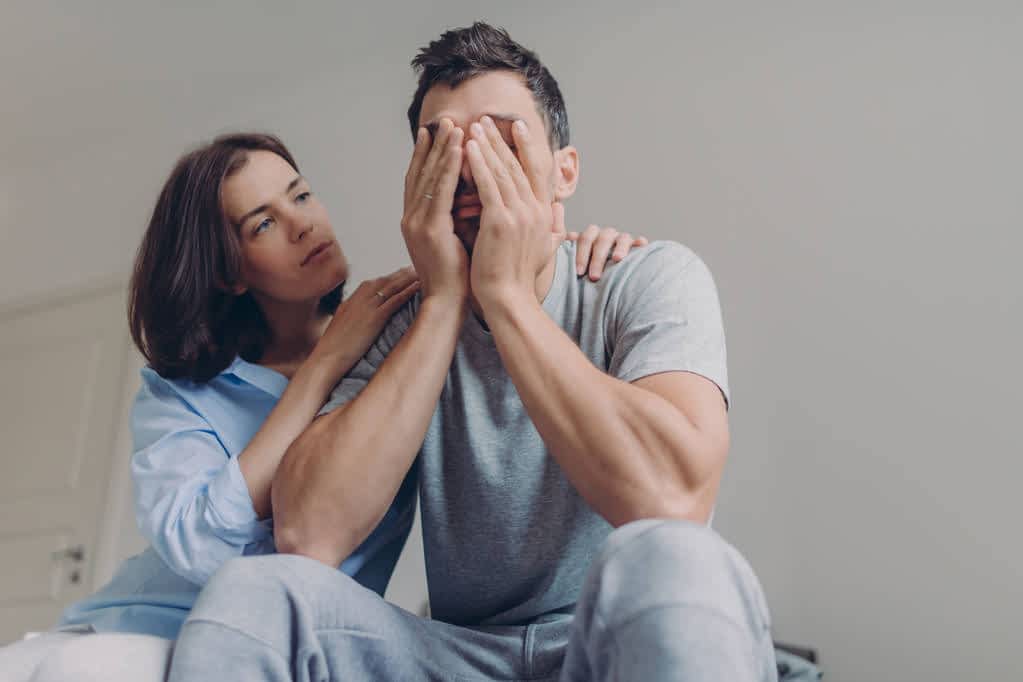Empathic Ruptures in Relationships: 5 Critical Moments You Can’t Ignore
Empathic ruptures in relationships are the emotional equivalent of stepping on a Lego barefoot. They hurt like hell, usually come out of nowhere, and leave you questioning your life choices. It could be that it’s a weird silence, a tone that hits wrong, or that moment your partner just doesn’t get it, these emotional disconnects aren’t just little bumps in the road. They’re warning signs. If you keep brushing them off, don’t be surprised when the whole relationship starts feeling like a cold, awkward roommate situation.
If you’ve ever dealt with another human being, you’ve probably experienced an empathic rupture. And no, it’s not just a romantic relationship thing. These emotional disconnects can sneak into any kind of relationship; your doctor, your therapist (ironic, right?), your parents, siblings, boss, coworkers, even that one friend who always somehow makes everything about them. Nobody’s immune, and sometimes it hits when you least expect it.
💡Key Highlights
- The real break doesn’t always make a sound.
- Connection fades in the small stuff.
- “I didn’t mean to” still leaves a mark.
- Silence can feel louder than shouting.
- You can be present and still miss everything.

When people think about relationship problems, they usually jump to the usual suspects: bad communication, money fights. You know, the obvious stuff. An empathic rupture can really chip away at even the strongest relationships.
These are those quiet moments when you feel totally misunderstood, brushed off, or just plain invisible. It might not seem like a big deal in the moment, but those tiny emotional gut punches add up. Left unchecked, they turn into deep fractures that are a hell of a lot harder to fix later – if they’re even fixable at all.

What Are Empathic Ruptures in Relationships?
An empathic rupture hits when there’s a sudden, jarring disconnect between your emotional world and your partner’s. It’s that gut-punch moment when you realize they’re not seeing you, not hearing you, and definitely not getting what you’re feeling. It’s more than just being annoyed or disagreeing; it’s when you feel so unseen that forgiving them doesn’t even feel like an option.
This isn’t your average argument or “we’re just not communicating” scenario. It’s the emotional equivalent of waving a white flag and getting a shrug in return. There’s no resonance, no click. Just the cold, quiet realization that your vulnerability landed with a thud.
The kicker is most people don’t even realize they’ve caused a rupture. It can be something as seemingly harmless as cracking a joke when you’re hurting, brushing off your fears, or jumping into problem-solving mode when all you needed was a damn hug. If you are on the receiving end those moments build a slow, creeping wall of emotional isolation.

5 Gut-Punch Moments That Signal an Empathic Rupture
🚩Here are five moments where empathic ruptures in relationships can occur and shouldn’t be ignored:
- When your vulnerability is dismissed – Sharing something deeply personal and having it brushed off or minimized.
- During emotional crises – When you’re struggling emotionally, but your partner offers no comfort or understanding.
- After repeated misunderstandings – Constantly feeling like your partner doesn’t “get” you or misinterprets your feelings.
- When affection feels hollow – Receiving surface-level affection or gifts instead of genuine emotional support.
- Following unresolved conflicts – Walking away from arguments with feelings of emotional isolation or being unheard.

Why Emotional Disconnect Matters More Than You Think
People love to downplay these moments, brushing them off as just little hiccups on the road to “happily ever after.” But here’s the truth: empathic ruptures are like termites: silent, small, and absolutely capable of destroying the whole damn foundation if ignored. When they’re left unresolved, they don’t just go away. They fester. They grow resentment in silence. And eventually, one or both partners start emotionally checking out.
The real danger isn’t the rupture itself – it’s the aftershock. When empathy keeps going MIA, the hurt partner starts building walls. They stop opening up, stop reaching out, and start protecting themselves instead of connecting. Little by little, the relationship starts to feel less like an emotional safe space and more like a cold war with polite small talk.
It’s not just losing trust; it’s losing the emotional glue that actually keeps you two in it together.

The Hidden Signs of Empathic Ruptures
Emotional disconnect is usually sneaky. One of the clearest signs is that dreaded “It’s fine,” said in a tone that screams nothing is fine. Sure, they say everything’s okay, but you can feel the emotional temperature drop three degrees.
These are the moments when empathy should’ve shown up and didn’t. The real problem comes with lot of partners completely miss the cue. They write it off as a mood swing or assume it’s no big deal. Trust me – it is.
And here’s another subtle red flag: over-the-top affection that feels just a little… off. Like surprise gifts, spontaneous date nights, and excessive compliments. It looks sweet on the surface, but often it’s just emotional spackle trying to patch over a rupture no one’s actually talking about. The gestures aren’t the problem; it’s that they’re being used to distract from a lack of real emotional connection. You can’t buy your way out of a broken bond of emotional trust.

How Empathic Ruptures Differ from Arguments
People love to lump empathic ruptures in with your standard fights or disagreements, but they’re not the same beast. A typical fight might get loud or messy, but at least there’s an exchange. You argue, vent, maybe say something dumb, but both of you walk away knowing something was said, something was heard.
An empathic rupture is a totally different story. It’s not just raised voices – it’s emotional silence. One person walks away feeling completely invisible, like their feelings didn’t even register. No back-and-forth. No acknowledgment. Just a heavy sense of being dismissed.
Fights might end in apologies or half-decent resolutions. Empathic ruptures leave behind a fog of loneliness and confusion. And if this keeps happening, you end up with two people under the same roof, sharing a bed but emotionally living in different zip codes.

Why Small Empathic Moments Matter More Than Big Gestures
Everyone loves the big romantic moves like flashy anniversary trips, expensive gifts, fancy dinners. But here’s the truth: relationships don’t survive on grand gestures alone. They live and breathe in the tiny, everyday moments that show up as the knowing glance across the room, the squeeze of a hand after a rough day, the simple “Hey, how are you really feeling?”
Empathic ruptures sneak in when those little moments get ignored. It’s not always about huge fights or epic breakdowns. More often, it’s the quiet misses: those micro-moments where empathy should’ve shown up but didn’t. That’s where the real emotional damage happens. And if you want to fix it, start paying attention to those small cracks before they turn into massive chasms.

How to Heal After an Empathic Rupture
Step one in fixing an empathic rupture is to admit it happened. Sounds simple, but most people don’t even realize when they’ve dropped the emotional ball. So instead of waiting for your partner to explode, bring it up gently; no finger-pointing required.
Try something like, “Hey, when you brushed off how I was feeling earlier, I felt really unheard.” It’s vulnerable without being aggressive, and it opens the door to actually talk instead of stonewalling or starting a fight.
And here’s the hard part – when your partner calls you out on your own empathic slip-ups, don’t get defensive. I know it stings, but try flipping the script: ask, “What can I do differently next time to really show up for you?” That kind of attitude goes miles toward healing, rebuilding trust, and proving you actually get them.

It’s Okay if Empathy Doesn’t Always Feel Natural
Here’s the thing about empathic ruptures – they’re usually not on purpose. A lot of people assume empathy is just built-in, like breathing. But for some folks, it’s not. Stress, exhaustion, personal baggage, all that noise can block someone from showing up emotionally, even if they love you to pieces. That doesn’t mean they’re a terrible partner. It means they’re human.
The key is realizing that empathy sometimes takes actual effort. It’s not always instinctive; it’s intentional. That means sometimes you’ve gotta give your partner a little nudge. A gentle, “Hey, I really need you to be present with me right now,” goes a lot further than silently hoping they’ll magically read your mind. Empathy isn’t a solo performance; it’s a duet. Even the most caring partner can miss the beat now and then, and that’s okay, as long as they’re willing to tune back in.

Final Thoughts
Empathic ruptures aren’t the big, fiery blowups you see in movies. They’re the moments where something feels off but no one says anything. Left unchecked, those little breaks pile up and start pulling you apart emotionally, until one day you’re more like roommates than partners.
The goal isn’t to avoid ruptures completely because that’s impossible. You’re human. You’ll mess up. What matters is catching them early and doing the repair work. Because it’s the small, intentional efforts like, the check-ins, the “Hey, I missed the mark there” – that keep a relationship alive. Otherwise, it’s death by a thousand emotional papercuts.
Thank you for reading this post, don't forget to subscribe!







